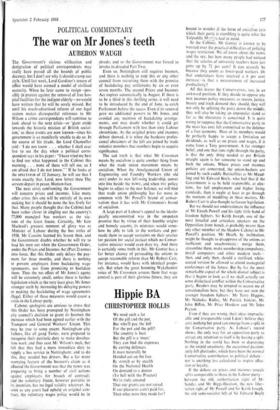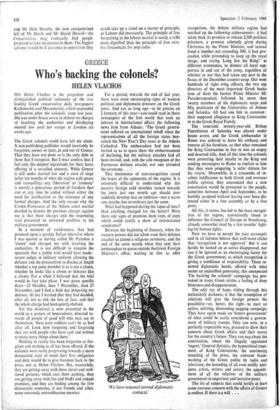The war on Mr Jones's teeth
POLITICAL COMMENTARY AUBERON WAUGH
The Government's vicious vilification and denigration of political correspondents may really have passed all the bounds of public decency, but I don't see why it should cramp our style. Until last week, Lord Gardiner's tenure of office would have seemed a model of civilised maturity. When he later came to resign—pos- sibly in protest against the removal of free hos- pital facilities for the indigent elderly—we would have written that he will be sorely missed. But until his much-advertised reform of our legal system makes disrespectful reference to Mr Wilson a crime correspondents will continue to look ahead to the next crisis—or 'giant stride towards the historic mission of British social- ism,' as these events are now known—since his government is so manifestly unable to do so. In the course of his tirade, the Lord Chancellor said : 'I do not know . . . whether I shall ever Jive to see the day when a political corre- spondent says in his paper : "I have tried my best to find out what happened in the Cabinet this morning . . . none of them will tell me, so I am afraid that I do not know."' If he looks at the SPECTATOR of 12 January, he will see that I wrote exactly that. Lord, now lettest thou Thy servant depart in peace. Mutton-face.
The next crisis confronting the Government will concern prices and incomes. Like many other crises this one will be entirely of its own making but it should be none the less lively for that. Many people thought that the Cabinet had been rather clever in singling out the country's 77,000 muncipal bus workers as the vic- tims of the latest freeze. Certainly, Mr lain Macleod's greatest moment of glory was as Minister of Labour during the bus strike of 1958. Mr Cousins learned his lesson then, and the Governnient doubts whether he will try to lead his men out when the Government Order, under the Prices and Incomes Act (Part 2) comes into force. But this Order only delays the pay- ment for three months, and there is nothing to prevent employers from backdating wage agremeents, nor from promising to backdate them. Thus the net effect of Mr Jones's agony will be extremely small, unless there is further legislation which at the very least gives Mr Jones stronger teeth by increasing his delaying powers or making the backdating of wage agreements illegal. Either of these measures would cause a crisis in the Labour party.
Cabinet apologists are anxious to stress that
this Order has been prompted by Nottingham city council's decision to grant its busmen the increase which had been agreed earlier with the Transport and General Workers' Union. This may be true to some extent. Nottingham city fathers, like all good Tories, were prepared to recognise their patriotic duty to make devalua- tion work and thus save Mr Wilson's neck, but felt that they had a more immediate duty to supply a bus service in Nottingham; and to do this, they needed bus drivers. But a far more worrying feature of the busmen's claim as it affected the Government was that the TGWU was preparing to bring a number of civil actions
against employers for breach of contract; and the voluntary freeze, however patriotic in its intention, has no legal validity whatever. As soon as any court had upheld an original con- tract, the voluntary wages policy would be in shreds; and so the Government was forced to invoke its dreaded Part Two.
Even so, Nottingham still requires busmen, and there is nothing to stop this or any other council from recruiting them with the promise of backdating pay settlements by six or even seven months. The second Prices and Incomes Act expires automatically in August. If there is to be a third in this thrilling series, it will need to be introduced, by the end of June, to catch Parliament before the recess. Even if its renewal gave no additional powers to Mr Jones, and avoided any mention of backdating arrange- ments, one may doubt whether it could get through Parliament with less than sixty Labour abstentions. As the original prices and incomes debate showed, it is when the hardcore profes- sional abstainers of the left are joined by trade unionist members that numbers begin to acquire significance.
The sad truth is that what Mr Crossman means by socialism is quite another thing from what the trade union movement means by socialism. When the Amalgamated Union of Engineering and Foundry Workers (the old Am)) under its new left-wing leadership, moves into line beside the TGWU, and when TUC policy begins to adjust to the new balance, we will find that trade union philosophy has far more in common with Mr Powelrs brand of conser- vatism than it has with Mr Crossman's brand of socialism.
A large part of Labour's appeal to the ideolo- gically uncommitted was in the unspoken promise that by virtue of their humble origins and homely accents, its ministers would some- how be able to talk to the workers and per- suade them to. accept restraints on their avarice (or passion for social justice) which no Conser- vative minister would even dare try. And there is certainly some truth in this. Mr Gunter has a far better chance of persuading the unions to accept reasonable reform than Mr Robert Carr, for instance, would have with identical propo- sals. But when the great booming Wykehamist voice of Mr Crossman assures them that wage control is part of their glorious future, they are bound to Wonder if the form of socialism into which their party is stumbling is quite what the Tolpuddle Mart:,:rs had in mind. • In the Cabinet, Mr Gunter is known to be
worried over the practical difficulties of policing wages restriction. We all know about the TGWU and the AEI', but how many people had noticed
that the salaries of university teachers have just gone up by 7f per cent? It can scarcely be because they count as lower-paid workers. Or that undertakers have received a 6 per cent increase—is that a measurement of increased productivity?
All this leaves the Conservatives, too, in an awkward position. If they decide to oppose any new incomes policy measures, as reason, justice, beauty and truth demand they should, they will not only be splitting the party down the middle, they will also be taking an unpopular stand so far as the electorate is concerned. It is quite wrong to suppose that the Conservative party in the mass has ever felt committed to the defence of a free economy. Most of its members would be perfectly happy to accept a limitation on dividends, as well as on prices and wages, if it came from a Tory government. A far stronger belief, and one that runs right through the party,
is that the only thing needed to put Britain straight again is for someone to stand up and bash the unions. Where prices and incomes policies are concerned, the union-bashers are joined by such cuddly Butskellites as Mr Maud
ling and Sir Edward Boyle, who feel that if the Government is to be held responsible, at elec- tions, for full employment and higher living standards, then it ought at least to go through the motions of meddling in these matters. Mr Robert Carr is also thought to favour legislation.
But we should not underestimate the influence of Mr Enoch Powell and his tight little band of freedom fighters. Sir Keith Joseph, one of the most forceful and articulate speakers on the Opposition front bench, is probably nearer than any other member of the Shadow Cabinet to Mr Powell's position. Mr Heath, by inclination, might be thought to disapprove of the unions as inefficient and anachronistic: merge them, streamline them, make membership compulsory, install computers and other modern tools then, and only then, should a sterilised, white- coated version be allowed to attend managerial conferences of the future. But by far the most remarkable aspect of the whole dismal subject is that it begins to look as if we shall actually see some dialectical conflict within the Conservative party. Readers may be tempted to accuse me of sensationalism here, but they have not seen the younger freedom fighters : Mr Terry Higgins, Mr Nicholas Ridley, Mr Patrick Jenkins, Mr John Biffen, Mr Peter Hordern and Mr John Pey ton.
Even if they are wrong, their ideas impractic- able and irresponsible (and I don't believe they
are), nothing but good can emerge from a split in
the Conservative party. As Labour's record shows, the only way for an opposition party to attract any attention to itself is by having a split.
Nothing in the world has been so depressing as the torpid unanimity, the occasional passion- ately felt platitudes, which have been the normal Conservative contribution to political debate—
nor is anything less calculated to inspire affec- tion or loyalty.
If the debate on prices and incomes reveals splits comparable to those in the Labour party— between the old, authoritarian right of Mr Sandys and Mr Biggs-Davison, the new liber- tarian right of Mr Powell and Sir Keith Joseph, the old semi-socialist left of Sir Edward Boyle and Mr Dick Hornby, the new cOmputerised left of Mr Heath and Mr David Howell—the Conservatives may eventually find people prepared to take an interest in them. The biggest advance would be if just once in opposition they could take up a stand on a matter of principle, as Labour did incessantly. The principle of free bargaining in the labour market is surely a trifle more dignified than the principle of free wire- less frequencies for pop radio.



































 Previous page
Previous page